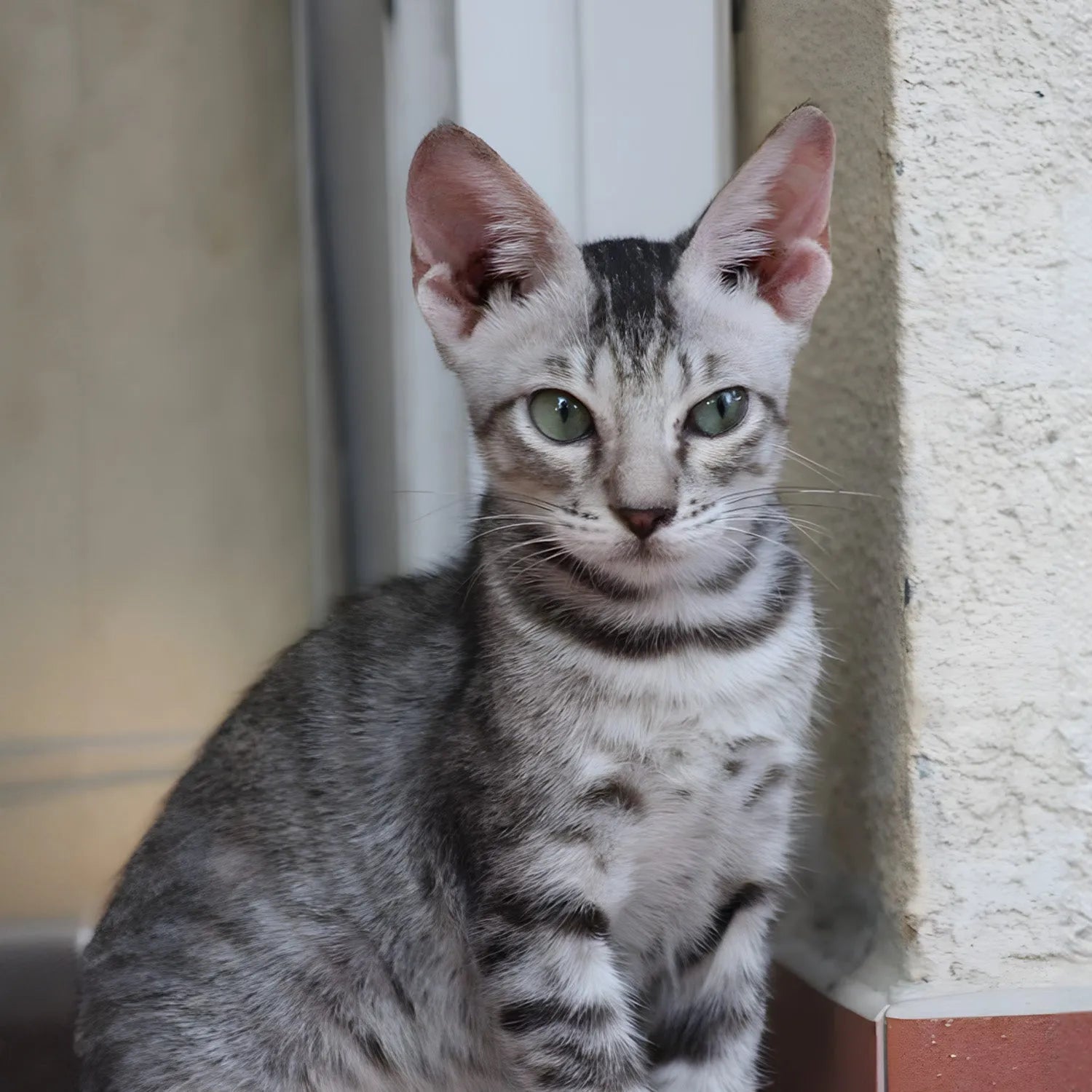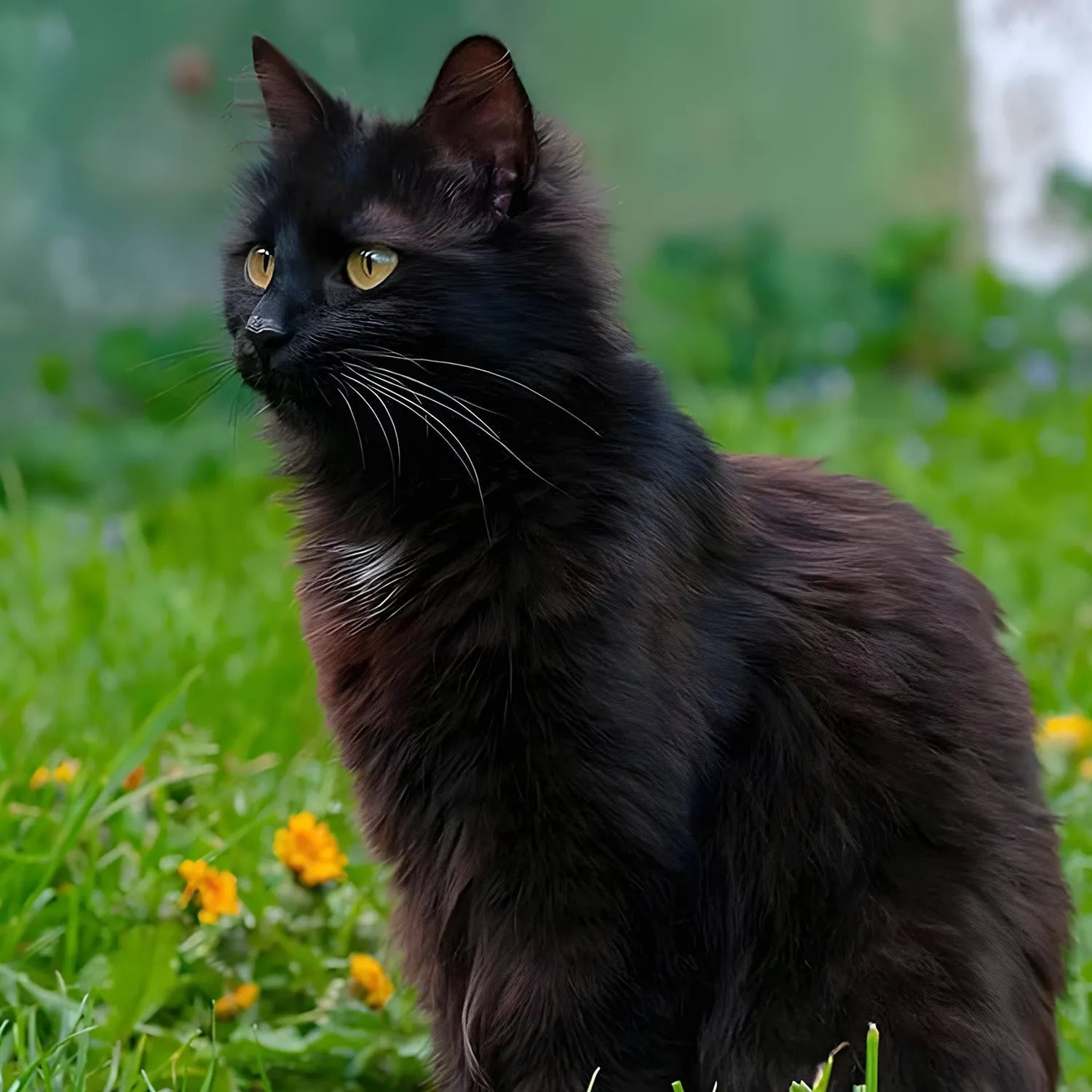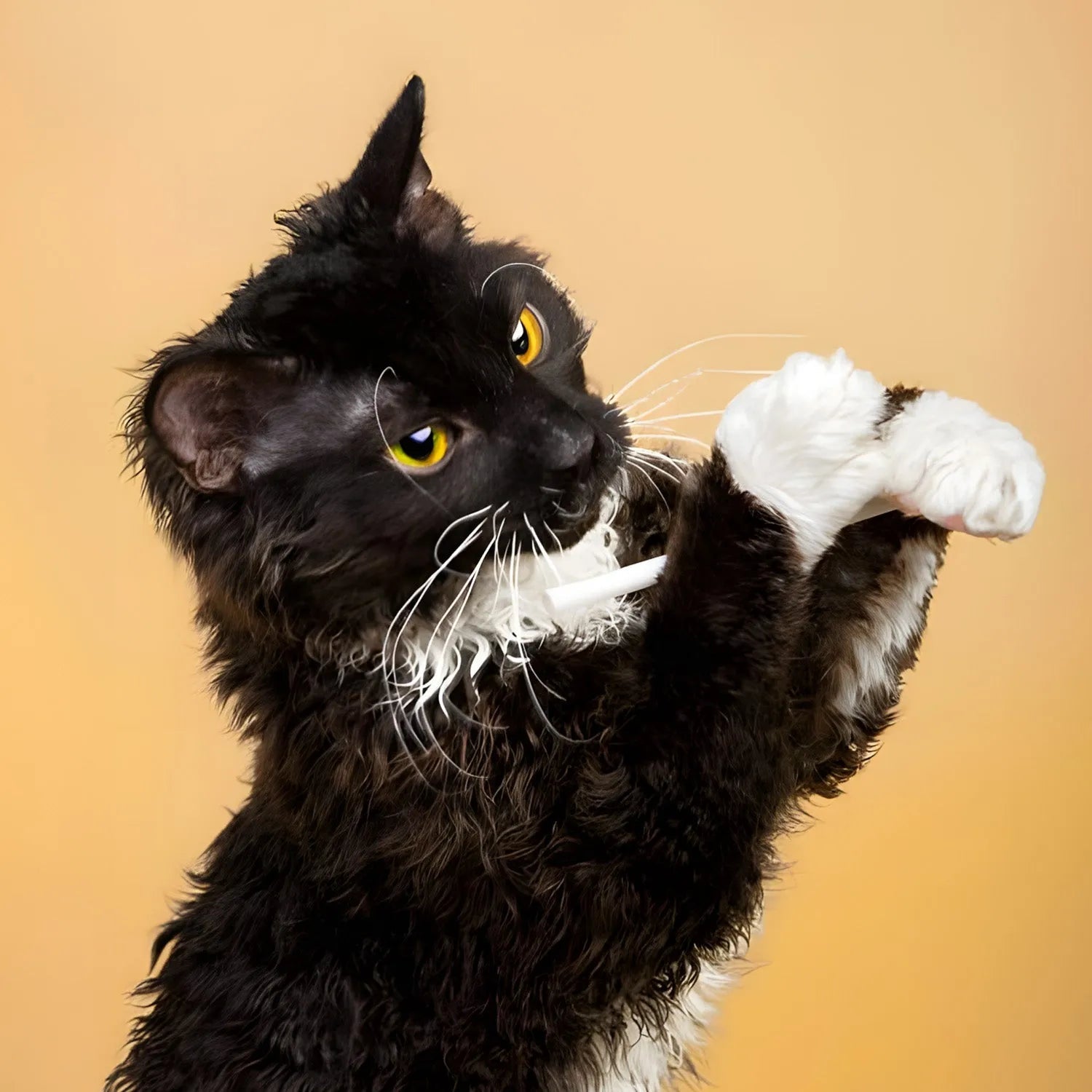Sphynx: The Hairless Wonder with a Big Personality
Introduction
The Sphynx cat is one of the most recognizable cat breeds, famous for its hairless body and striking appearance. But there’s more to this cat than its looks—the Sphynx is known for its affectionate, playful, and extroverted personality. These cats form strong bonds with their human companions, making them loving and loyal pets. While they may appear delicate due to their lack of fur, Sphynx cats are actually robust and energetic, often engaging in playful antics and showing off their quirky sense of humor. In this blog, we’ll explore the Sphynx cat’s lifestyle, behavior, grooming needs, and how it interacts with humans and other pets.
Ratings (1-5)
-
Environmental Adaptability: 3
-
Food Consumption: 4
-
Need for Companionship: 5
-
Trainability: 5
-
Tolerance of Children: 5
-
Ease of Domestication: 5
History and Origins
The Sphynx cat is a relatively modern breed, with its origins dating back to the 1960s. The breed began when a hairless kitten was born to a domestic cat in Canada. This natural genetic mutation intrigued breeders, who began selectively breeding hairless cats to develop the Sphynx as we know it today.
While hairless cats have appeared sporadically throughout history, the Sphynx breed was developed intentionally through careful breeding, primarily in North America. Over the years, breeders introduced other cats, such as Devon Rex, into the gene pool to maintain genetic diversity and improve the breed's overall health.
The breed was officially recognized by The International Cat Association (TICA) in the 1970s and later by the Cat Fanciers’ Association (CFA). Today, the Sphynx is beloved by cat enthusiasts for its unique appearance, friendly personality, and affectionate nature.
Physical Characteristics and Colors
The Sphynx cat’s most striking feature is its hairless body, although some Sphynx cats have a fine layer of fuzz that gives them a peach-like texture. Their skin is soft, warm, and wrinkled, and they come in a variety of colors and patterns. Because the pigment in their skin reflects their coat color, Sphynx cats can be solid-colored, bicolor, or even have tabby or point patterns.
Sphynx cats are medium-sized with a muscular, sturdy build. Despite their lack of fur, they are surprisingly robust and strong. Their heads are wedge-shaped with prominent cheekbones, large, lemon-shaped eyes, and large ears that give them an alert and inquisitive expression. Their long, whip-like tails and webbed feet add to their distinctive appearance.
Common skin colors and patterns in the Sphynx include:
-
Solid: Pink, black, blue, cream, and red.
-
Bicolor: A mix of any solid color with white patches.
-
Tabby: Striped or swirled patterns visible on their skin.
-
Pointed: Darker color on the ears, face, paws, and tail, similar to Siamese cats.
While the Sphynx is often recognized for its hairlessness, it’s important to note that each cat's skin texture and level of hairlessness can vary. Some Sphynx cats may have fine down on their bodies, while others are completely hairless.
Lifestyle and Behavior
Sphynx cats are known for their energetic and playful personalities. These cats are incredibly active and love to explore their environment, climb on furniture, and engage in interactive play with their human companions. Despite their regal appearance, Sphynx cats are not aloof or distant—they are social butterflies who crave attention and love being in the spotlight.
These cats are known for their extroverted nature and often act more like dogs than cats. They will follow their owners around the house, sit on laps, and even greet guests at the door. Sphynx cats are curious, confident, and love to be the center of attention. They are also very affectionate and enjoy snuggling with their human companions to stay warm due to their lack of fur.
While Sphynx cats are independent enough to entertain themselves when needed, they prefer being in the company of their human family members. They are social cats that thrive in homes where they can receive plenty of attention, playtime, and affection.
Trainability and Intelligence
Sphynx cats are highly intelligent and can be trained to follow commands, perform tricks, and even walk on a leash. Their playful and curious nature means they enjoy mental challenges and interactive games that stimulate their minds. Sphynx cats are quick learners and respond well to positive reinforcement techniques, such as treats and praise.
Because they are so people-oriented, Sphynx cats enjoy activities that involve their owners. Training sessions should be interactive and fun, as Sphynx cats love the attention and the challenge of learning new things. Puzzle toys, interactive feeders, and games of fetch are great ways to keep these intelligent cats entertained.
Their intelligence and curiosity also mean that Sphynx cats can figure out how to open doors, cabinets, or find hidden treats. Owners should provide plenty of toys and activities to keep their Sphynx mentally stimulated and prevent boredom.
Social Behavior and Human Interaction
Sphynx cats are incredibly social and affectionate. They form strong bonds with their human family members and thrive on interaction. Sphynx cats love being the center of attention and will often seek out their owners for cuddles, playtime, or simply to be near them.
These cats are known for their love of physical contact, and they are often referred to as "velcro cats" because of their tendency to stick close to their owners. Sphynx cats enjoy curling up in their owners' laps, snuggling under blankets, or sitting on their shoulders. Their lack of fur means they are more prone to getting cold, so they appreciate the warmth and comfort of human contact.
Sphynx cats are not shy and will often greet visitors with curiosity and friendliness. They are outgoing and confident, making them well-suited to homes with lots of activity or guests. While they love being around people, they are also independent enough to entertain themselves when needed, provided they have toys and stimulation.
Compatibility with Children and Other Pets
Sphynx cats are excellent companions for children due to their playful and affectionate nature. They enjoy interactive play and are generally patient with children’s antics, provided they are treated with respect. Their outgoing and social personalities make them great companions for kids who enjoy engaging in games and activities.
In addition to being good with children, Sphynx cats also tend to get along well with other pets, including dogs. Their confident and friendly nature allows them to integrate well into multi-pet households, and they often enjoy the company of other animals. Proper introductions are important, but Sphynx cats are generally accepting of new furry family members and are known for their ability to get along with both cats and dogs.
Grooming and Care
Despite their hairless appearance, Sphynx cats require regular grooming to keep their skin healthy. Without fur to absorb oils, their skin can become greasy, so regular bathing is necessary—typically once a week or every two weeks. A gentle cat shampoo is recommended to clean their skin and remove any dirt or oil buildup.
In addition to regular baths, Sphynx cats require routine ear cleaning, as their large ears can accumulate wax more quickly than other breeds. Their nails should also be trimmed regularly, and their paws cleaned to remove any debris or dirt.
Because they lack fur, Sphynx cats are more sensitive to temperature changes. They can get cold easily, so owners should provide warm blankets, beds, or even sweaters to keep them comfortable. In colder climates, it’s important to ensure that your home is warm enough for your Sphynx, especially in the winter months.
Health and Lifespan
Sphynx cats are generally healthy, but like all breeds, they can be prone to certain genetic health conditions. Some common health concerns include hypertrophic cardiomyopathy (HCM), a heart condition, and skin issues such as fungal infections or rashes due to their hairless skin. Responsible breeders screen for these conditions to reduce the risk of passing them on to future generations.
Regular veterinary check-ups, a balanced diet, and maintaining a healthy weight are essential to keeping your Sphynx cat in good health. With proper care, Sphynx cats typically live 10-15 years or more, making them long-term companions for any family.
Environmental Adaptability
Sphynx cats are indoor cats that require a warm and comfortable environment. Their lack of fur makes them more sensitive to temperature changes, so they
are best suited to homes where the temperature is kept consistently warm. In colder climates, it’s important to provide them with warm blankets, cozy beds, or cat sweaters to keep them comfortable.
Sphynx cats enjoy having access to soft, warm places where they can relax, such as heated cat beds or sunny spots by the window. They also appreciate interactive play and need plenty of toys, climbing structures, and perches to stay active and engaged.
Because of their social nature, Sphynx cats do best in homes where they can receive plenty of attention and interaction from their human family members or other pets. They are not well-suited to homes where they will be left alone for long periods.
Feeding Requirements
A balanced diet is crucial for maintaining the health and energy levels of Sphynx cats. High-quality cat food that is rich in protein is recommended to support their muscular build and overall well-being. Fresh water should always be available. Because Sphynx cats have higher metabolisms due to their lack of fur, they may require more food than the average cat, so owners should monitor their food intake to ensure they are receiving the proper nutrition.
Consult your veterinarian for specific dietary recommendations based on your cat's age, weight, and health needs. Regular play sessions and activities that encourage physical movement can also help keep your Sphynx healthy and fit.
Conclusion
The Sphynx is a unique, affectionate, and playful breed that brings warmth and joy to any home. Their strong bonds with their human companions, combined with their extroverted and social personalities, make them wonderful pets for families, individuals, or anyone looking for a loving and interactive cat. If you're searching for a feline friend that will offer endless affection and entertainment, the Sphynx may be the perfect fit.
For more information about other cat breeds and pet care tips, stay tuned to our blog!
References:
-
Davis, M. (2021). "The Hairless and Affectionate Sphynx Cat." *Journal of Feline Studies*, 35(3), 215-230.
-
Thompson, A. (2020). "Caring for Your Sphynx: A Comprehensive Guide." *Cat Lover’s Magazine*, July issue, pp. 25-33.
-
Harris, E. (2019). "Health and Wellness in Sphynx Cats." *Veterinary Journal*, 79(2), 123-137.


